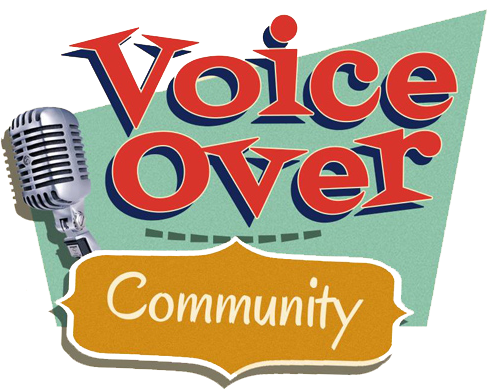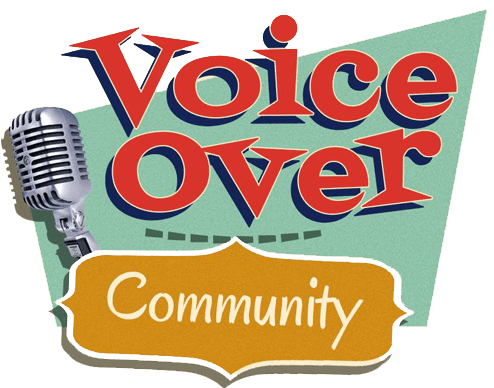It’s Not About The Voice Talent
The good news & the bad news
Having started out as an actor in New York, then spending many years as a promo writer-producer (and part-time voice actor) for many different cable networks, to becoming a full-time voice actor several years ago, I have the unique advantage of experiencing this business from both sides of the mic.
Part of my job as a producer was to shortlist voice over artists who auditioned for my projects (for final selection by the execs) and then direct the chosen talent in the recording sessions. Little did I realize, at the time, that producing and directing voice talent would be the most valuable training for me in my voice acting career.
So, let’s take a little dive down to the body of the iceberg for a peak into the vo biz from the other side.
Take tv promos, for instance. First, there’s the meeting to create a concept that will entice an audience to watch the network’s content, which has to be approved by the Creative Director and then the upper execs. Once the concept is approved, the script gets written (with a voice type already in mind) and goes through rounds of revisions and approvals. Once the script is finally approved, the producer edits together a roughcut video of the spot with temporary graphic placements (for timing) as well as their own voice as the scratch track, and a music track they think best creates the mood for the content they’re promoting. That roughcut now goes through rounds of revisions and approvals, and maybe there are even some more script tweaks now that everyone is seeing the spot play out in real time, and then it’s eventually approved.
Then, the producer has to work with the design team to come up with the final motion graphics that will make the spot look polished. Only then does the voice over artist come into the picture. *To be fair, most networks have their regular, go-to VO talent, so it’s usually just a matter of booking them, but on occasion a spot might call for a totally different voice type. (e.g. Holiday spots, specials, marathons, etc.) So, a producer will often check out demos or post auditions on P2P sites, make their shortlist from there and send it up the chain for selection.
Once everyone is on board with the voice talent, they can get into the recording studio (or, record remotely, depending on the situation). Once the final voice over is added to the spot, and it gets mixed and mastered by the audio engineer, it goes through yet another round of approvals.
Aaaalllll that for just a fifteen-second spot.
Now, I know many voice over artists are thinking, “Aaaah, saved the best for last”. Well, yes and no. The voice over is indeed the icing on the cake. However, a lot of work went into making this “cake” to create a certain flavor, a certain vibe, and it’s now your job to really sell it (in a non-salesy, conversational, friendly manner, of course). So, while the production team has spent the past week or two fully immersed in this project, getting their hands in the mixture, tweaking the ingredients, perfecting it, and then proudly displaying it for the powers-that-be, you’re expected to whip up the perfect topping that hits all the right notes and blends perfectly with all those ingredients to make it shine, having only spent about five minutes with it.
In other words, you need to have the experience (not just the talent) to be able to jump in at this late stage of the process and read it like you’re equally as invested.
I know it’s easy for us voice actors to feel like the main attraction of that documentary or that commercial; we want to be acknowledged, appreciated, maybe even celebrated, just like any other actor out there. But, the truth is, voice acting is a very different entity. By design, we’re meant to be invisibly impactful. For a reason.
The brand who hires us doesn’t do so simply because we’re talented or even because of our delightful personalities (and certainly not because of our social media accounts). They hire us because they feel our audition or demo embodies and represents their brand’s vibe and overall message. They cast us because we won’t steal the show, so to speak. We’ll add to it. Because the truth is – we’re not the star. The product is the star.
The more you understand that you’re not the star of any job you book, but rather a “partner” helping to create the piece, the better your performance will be and the greater your reputation among clients will be, because you’ll have the focus to really connect to the text and provide the client with what they need, from performance to editing to mastering, as efficiently as possible. Which is what clients are really looking for: a collaborative professional who embodies the overall energy of the brand and has the skills to deliver excellent quality in a timely manner… because at this point, it’s only a matter of days – or even hours – before the spot has to air/land. This is why experience, and not just talent, matters.
Now for the good news! You know what else is not about the VO talent? REJECTION.
Now, we’ve all done this to ourselves. We’ve all auditioned for that job that we knew in our bones was meant for us. The one that seemed written just for us. The one we spent an hour recording and fussing over to make juuuuust right. The one we, ultimately, didn’t end up booking. Uuuuuugh, arrrrrrrgh, whyyyyyyy Universe whhhyyyyyy?? I did everything the client asked for … and more! What did I do wrong???
Nothing. (Most likely. I mean, I don’t know you, so I can’t really say for sure, but if you’ve got broadcast quality audio and you’re booking jobs frequently and getting shortlisted often, then I stand by this statement.) Nothing at all.
Now that you have a glimpse into the production process (for tv promos and ads, at least) you can see that we’re in a very subjective business, so it’s almost impossible to give a scientific explanation for why you didn’t get the role. And no matter how many articles or webinars tell you they have the secret to booking more jobs, or fast-tracking your career, don’t fall for it. There is no formula, no miracle-grow trick, and no sure-thing or guarantee. Many different paths will lead to the same destination. If you want to get zen about it, there is only booking and not booking. Shortlisting and not shortlisting. (By the way, if you’re getting shortlisted often, that’s a great sign! That means out of all the people who auditioned, you’re in the top 3 to 5 being considered for hire. So, don’t give up.)
As Robin Williams says in Good Will Hunting, “it’s not your fault”. Here’s why you might have gotten rejected, from a production perspective:
If you’re female, it often happens that the client decides to go with a male vo artist, instead. The ratio of men to women in this field is approximately 60/40, these days. (Ok, so this one is a bit scientific. But, still not your fault)
Or, the client decides they want a high pitched voice, and you have a low pitched voice, or vice versa. (Not your fault.)
Or, maybe you sound too close to another voice actor they hired for another project for the same company, and they want a distinct contrast. (Not your fault.)
It could be that your voice reminds them of an ex they’d rather not be reminded of… or a famous person they don’t necessarily want to associate with their product. (Not your fault.)
Perhaps they’re in a massive rush and have to cast someone quickly and so they choose someone from within the first ten auditions and didn’t even get around to listening to your audition. (Not your fault.)
Or, they simply prefer another’s voice to yours for reasons even they don’t understand. (Not your fault.)
Or, perhaps you sound too close to their competition’s main voice over artist. (Not your fault.)
Or, the end client changed their mind about the type of voice they wanted midway through the project because they changed the style of music for the piece and your voice no longer fits with it. (Not your fault.)
Or, the client struggles to articulate what it is they need, and even though you followed their direction to a T, it wasn’t what they actually meant. (Not your fault.)
Or, you’re competing against the voice the client had in their heads when they first wrote or read the script. (Not your fault.)
Or … and this is the most common … there are hundreds of other equally talented and experienced voice artists auditioning for the same role and only one can be selected. (Not your fault.)
Overall, you’re far more likely to have long-term success by being a humble, highly skilled, hardworking performer who is easy to work with than by having flashy marketing messages/images or a large social media following. I’m not saying it’s bad to have some flash, but it shouldn’t be the main thing you have to offer. At the end of the day, it’s about how the cake tastes rather than how it’s decorated. (Dammit, now I want cake.)
Maybe you find some of this frustrating, but hopefully you find a lot of relief in it, as well. Most of the responsibility isn’t on our shoulders as voice talent, so that’s good, right? All we really need to do is continue to sharpen our performance and tech skills, audition our cords off, and be a buttoned-up professional who makes the client’s job that much easier… and maybe even wildly fun.
Share this across your favorite social channels
About Author
Liz Fodor
From actor to tv writer-producer to full-time voice actor, Liz has been creating voices for characters all over the world, for over 25 years. So, she’s full of experience, full of skills, and her fridge is full of green apples and lemon-water. (And probably leftover pizza, if she’s honest.)
She can currently be heard in the international video game 3 Minutes to Midnight as the voice of Lorraine Callaway, as well as in Playmobil’s short films: Horses of Waterfall as Muriel and Harleen, and Pirates – Dark Kraken’s Revenge as Pirate Queen Ro. She’s also the voice of Revlon’s UniqOne global campaign, the audiobook narrator for international best-seller A Good Life by Virginie Grimaldi, and is a regular narrator for Underknown’s Your Body On educational series.
Music is also a big part of Liz’s world. As a trained musician/composer and former violinist and chorus singer, Liz has performed in and scored many different tv and film projects over the years. And, in 2019, she had the incredible good fortune to sing in the Carnegie Hall chorus for the "250 Years of Beethoven, Celebrated!" program.
Liz is also trained in the fine arts with a concentration in painting and illustration. Yep, she really didn’t believe in having any stable back-ups whatsoever, it seems.
www.lizfodorvoiceover.com
Instagram: @lizfodor
Instagram (art page): @lizfodor.art










Share your thoughts
Comments